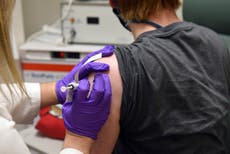Popular baby foods contain toxic heavy metals, congress finds
'Exposure to toxic heavy metals causes permanent decreases in IQ, diminished future economic productivity, and increased risk of future criminal and antisocial behaviour in children,' report warns
Your support helps us to tell the story
From reproductive rights to climate change to Big Tech, The Independent is on the ground when the story is developing. Whether it's investigating the financials of Elon Musk's pro-Trump PAC or producing our latest documentary, 'The A Word', which shines a light on the American women fighting for reproductive rights, we know how important it is to parse out the facts from the messaging.
At such a critical moment in US history, we need reporters on the ground. Your donation allows us to keep sending journalists to speak to both sides of the story.
The Independent is trusted by Americans across the entire political spectrum. And unlike many other quality news outlets, we choose not to lock Americans out of our reporting and analysis with paywalls. We believe quality journalism should be available to everyone, paid for by those who can afford it.
Your support makes all the difference.A report from Congress has found that baby food made by several big brands contain toxic materials. The heavy materials include arsenic, lead, cadmium and mercury, substances that can put a child's "neurological development and long-term brain function" in jeopardy, the report states.
"Exposure to toxic heavy metals causes permanent decreases in IQ, diminished future economic productivity, and increased risk of future criminal and antisocial behaviour in children," the report warns.
Released by the House Oversight Committee’s subcommittee on economic and consumer policy on Thursday, the report says that rice cereals, sweet potato puree, juices and sweet snack puffs were found to contain heavy metals. The foods were made by some of the biggest and most trusted brands in the country.
Companies that submitted internal testing documents to the committee included Gerber, Beech-Nut, HappyBABY, and Earth’s Best. The report also says that arsenic, cadmium, and lead were "present in baby foods made by all responding companies".
Campbell Soup and its brand Plum Organics, Walmart's Parent’s Choice, and Sprout Foods didn't take part in the report.
Illinois Representative and Subcommittee Chair Raja Krishnamoorthi told The Washington Post that “Over the last decade advocates and scientists have brought this to the attention of the Food and Drug Administration... The FDA must set standards and regulate this industry much more closely, starting now. It’s shocking that parents are basically being completely left in the lurch by their government".
Read more: Follow live updates on the Biden administration
Arsenic is ranked number one of naturally occurring substances that can pose a risk to humans, according to the Department of Health. Apart from rice cereal which is limited at 100 parts per billion, there's no limit set by the FDA for how much arsenic baby food can contain. For reference, bottled water is limited at 10 parts per billion.
Hain Celestial Group makes Earth's Best. They didn't test finished products, but some of their ingredients used in their line of baby foods were found to contain as much as 309 parts per billion of arsenic, and at least 24 of their ingredients went past 100 parts per billion.
Lead is ranked just after arsenic in terms of dangerous materials. There's no federal standard for the amount of lead in baby food, but most experts agree that it should not go over 1 part per billion.
Ingredients used by Beech-Nut were found to hold as much as 886.9 parts per billion of lead. 483 ingredients went over 5 parts per billion.
The chemicals policy director at the Environmental Defense Fund Tom Neltner told The Washington Post: “Exposure to these toxic heavy metals affects babies’ brain development and nervous system, it affects their behaviour, permanently decreases their IQ and, if you want to boil it down to dollars, their lifetime earnings potential."
Mr Krishnamoorthi said: “For the companies that didn’t participate, it raises the concern that they might possess information that indicates the toxic metals in their foods might be even higher than their competitors... I’d hope that companies would start testing not only their ingredients but their finished products... and I’d hope that companies then labelled their products to show the presence of these toxic ingredients, and would eventually phase them out.”
The FDA said in a statement: “Toxic elements, like arsenic, are present in the environment and enter the food supply through soil, water or air. Because they cannot be completely removed, our goal is to reduce exposure to toxic elements in foods to the greatest extent feasible and we have been actively working on this issue using a risk-based approach to prioritize and target the agency’s efforts.”






Join our commenting forum
Join thought-provoking conversations, follow other Independent readers and see their replies
Comments